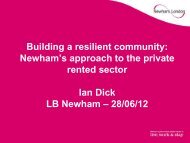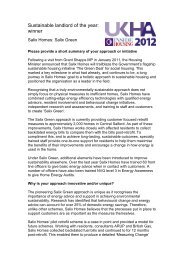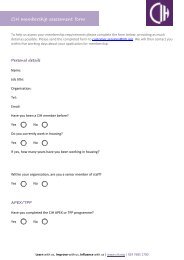View publication - Chartered Institute of Housing
View publication - Chartered Institute of Housing
View publication - Chartered Institute of Housing
Create successful ePaper yourself
Turn your PDF publications into a flip-book with our unique Google optimized e-Paper software.
PART TWO: LEADING TOMORROW<br />
Conclusion – becoming a learning organisation<br />
By John Thornhill, Learning Officer at CIH<br />
‘Learning is the kindling <strong>of</strong> a flame, not the filling <strong>of</strong> a vessel.’<br />
Socrates<br />
This anthology has explored the skills and learning pr<strong>of</strong>essionals in the housing industry<br />
will need to thrive in the future. It has also explored the characteristics <strong>of</strong> learning<br />
organisations because in a context <strong>of</strong> rapid and unprecedented change, it is only<br />
organisations that can maximise collective learning in flexible and adaptive ways that will<br />
succeed. So what is a learning organisation?<br />
A learning organisation takes a joined-up approach to different learning elements:<br />
• It actively encourages and supports personal development and the personal<br />
commitment <strong>of</strong> individuals to engage in their own learning.<br />
• It recognises that learning is not just for individuals. To be valuable to the<br />
organisation it has to be transferable. Transferrable learning is the sum total <strong>of</strong><br />
individual learning. Learning organisations recognise the need to develop<br />
mechanisms for individual skills and knowledge transfer across the wider<br />
organisation.<br />
• It values collective learning and supports structures that facilitate the sharing <strong>of</strong> skills<br />
and knowledge across teams and hierarchies.<br />
• It takes a strategic approach to knowledge management by investing in mechanisms<br />
which allow the creation, dissemination, and implementation <strong>of</strong> knowledge across<br />
the organisation.<br />
• It develops shared visions and a shared identity that provides focus and energy for<br />
individual and collective learning.<br />
• It is willing to ‘un-learn’. That is, it supports a culture open to inquiry and to leaving<br />
behind out-dated values, behaviours and ways <strong>of</strong> working.<br />
In addition, contributors to this project have emphasised the following features <strong>of</strong><br />
successful learning organisations:<br />
Developing a culture <strong>of</strong> learning – Authors have discussed the importance <strong>of</strong><br />
establishing a strong culture <strong>of</strong> learning as being a good thing in its own right. The<br />
creation <strong>of</strong> a culture <strong>of</strong> learning is seen as extending beyond the boundaries <strong>of</strong> job<br />
148

















